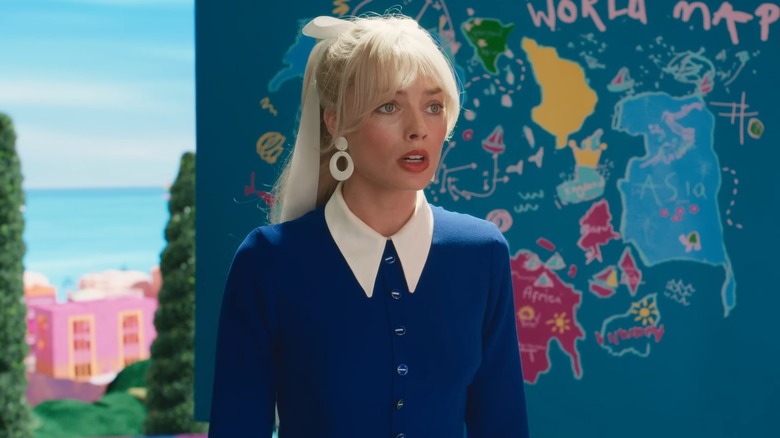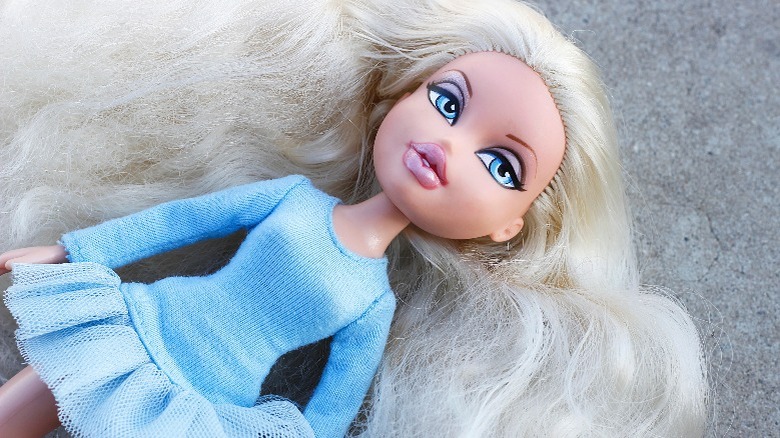Barbie Vs Bratz TV Series May Explore The Rivalry Teased In Greta Gerwig's Film
There have been few other times in which so many people were talking about Barbie — the brand, the doll, the character, the philosophical concept — at the same time. And that's saying a lot for arguably the single most iconic and widely known toy line in modern world history. Chalk it up, of course, to the "Barbie" film by Greta Gerwig, which has become a record-shattering box office sensation as well as an absolute critical success, captivating millions around the world with its surprisingly meditative and heartfelt story about a Barbie (Margot Robbie) finding her place in the world. The film's appeal didn't stop at just existential musings, naturally. It also made a meal of Barbie's rich pop cultural history, including at least one sly nod to the superstar doll's decades-long rivalry with the Bratz dolls.
That rivalry, as a matter of fact, may be even deeper and more significant than some of the public might realize. Barbie and Bratz have also duked it out behind the playtime scenes, in a complex, bitter legal battle chronicled by University of San Diego law professor Orly Lobel in the nonfiction book "You Don't Own Me: How Mattel v. MGA Entertainment Exposed Barbie's Dark Side."
Now, Deadline reports that CBS Studios has acquired the book's rights for series development — meaning that we may soon be seeing a Barbie vs. Bratz TV show taking place not in either property's respective inner universe but in the real world.
You Don't Own Me dives into a conflict between Ruth Handler and Carter Bryant
"You Don't Own Me: How Mattel v. MGA Entertainment Exposed Barbie's Dark Side" follows two parallel stories: The first is that of Ruth Handler, the creator of Barbie, memorably played by Rhea Perlman in "Barbie." The second is the story of Carter Bryant, the creator of Bratz — who, not unlike America Ferrera's character, Gloria, in Greta Gerwig's blockbuster film, was actually a Mattel employee himself before everything went down.
As depicted in Orly Lobel's book, Bryant designed the Bratz as a sort of anti-establishment alternative to Barbie, intended for girls who might not be so into Handler's controversial, monolithic creation but still wanted appealing dolls of their own to play with. Lobel recounts how Bryant's decision to sell his original doll concept to MGA Entertainment while still employed by Mattel ultimately led to a lengthy legal war.
The "You Don't Own Me" series adaptation is also set to dive into that legal war, against the backdrop of "the cultural revolution that Barbie spawned, the subsequent backlash, and the cut-throat, high-stakes world of toys," positioning both Handler and Bryant as troubled visionaries. If the series does get produced and makes it all the way to screen, we'd be talking, of course, about a uniquely auspicious meeting of trends — namely, between Hollywood's growing interest in fact-based stories about famous brands and products (also including recent films like "Air," "Flamin' Hot," "BlackBerry," and "Tetris") and the ongoing Barbie cultural renaissance.
Bratz began as the daydream of a Barbie outfit designer
Bratz dolls are far more recent than Barbies in the macro; while Mattel first launched Ruth Handler's iconic creation in 1959, Carter Bryant's line of big-headed dolls first hit the toy market in 2001. As detailed in Lobel's "You Don't Own Me" book, Bryant originally dreamed of being a fashion designer and took an on-and-off position at Mattel in which he would have the opportunity to create clothes for Barbies — only to find the job itself creatively stifling due to the vast limitations and pressures placed upon his work by Mattel. Bryant eventually found himself dreaming up a set of wholly original doll characters with a more hip attitude and a less risk-averse fashion philosophy. Those characters would later be purchased by MGA Entertainment and become the Bratz.
While not an immediate sales hit, Bratz dolls enjoyed a steady growth in the months and years following their launch, and eventually became a serious threat to Barbie's monopoly in the fashion doll market. It was then, as Lobel goes on to explain in her book, that Mattel decided to take things to court: It alleged that Bryant had created Bratz while working for Mattel and that the brand's ownership was therefore subject to dispute. The subsequent legal battle between Mattel and MGA was a watershed moment in the history of the American toy industry. And, as demonstrated by the "Barbie" movie in itself, even as the legal dust settled, the rivalry between Barbie and Bratz remained very much alive in pop culture.
The rivalry exists in fiction as well as real life
Different approaches to fashion, different approaches to film and TV offshoots, different approaches to worldbuilding and messaging for girls — as anyone who's ever been a kid torn between them can attest, the Barbie-versus-Bratz clash of titans extends beyond the bounds of a grown-up legal dispute. If Barbie exists as a universal, all-encompassing normative center to the way we've conceived of dolls and their roles in children's lives in modern consumer culture, Bratz is Barbie's countercultural equivalent: fashion dolls, but for kids who have no use for Barbies. It was exactly this confrontational attitude toward the fashion doll "canon" that allowed Bratz to become so popular so quickly.
It's no wonder, then, that the reference to Bratz in "Barbie," the movie, comes in the form of the character who first brings Barbie down a peg in the human world: Sasha (Ariana Greenblatt), Gloria's moody teenage daughter and inveterate Barbie skeptic. In the scene that finds Sasha shutting Barbie down and reading her for filth — to the point of calling her a "fascist" — when she tries to visit her at her school, Sasha and her three friends (played by McKenna Roberts, Sasha Milstein, and Brylee Hsu) are seemingly cast, positioned, and styled so as to evoke the original line of four Bratz dolls developed by Carter Bryant, one of whom was even named Sasha herself. If there's fodder for that much brand-versus-brand tension even in fiction symbolism, one imagines the potential TV series adaptation of Lobel's book will have a lot of meaty material to dig into.



